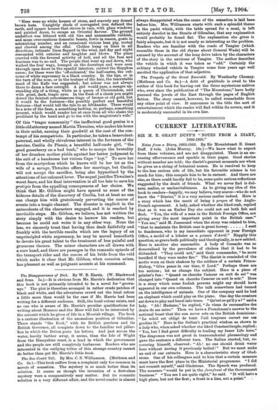Notes from a Diary, 1892 - 1895. By Sir Mountstua.rt E. Grant
Duff. 2 vols. (John Murray. 18s.)—We know what to expect from these volumes, and are not disappointed. There is an un- ceasing effervescence and sparkle in their pages. Good stories without number are told; the diarist's gravest moments are when he gives us a string of botanical names. He is resolved to keep to the less serious side of life, but his favourite science is too much for him; this compels him to be in earnest. And there are also, as there could hardly fail to be, some quite serious reflections suggested by the death of friends. What we never find is dul- ness, malice, or uncharitableness. As to giving any idea of the book to readers—happily, we may believe, very scarce—who do not know the " Diaries," it is a very serious matter indeed. Here is a story which has the merit of being d propos of the Anglo- French agreement. A lady, asked whether she liked crab, replied that as it was an Ember Day she could not eat both fish and flesh. " You, the wife of a man in the British Foreign Office, are giving away the most important point in the British case." " You see," said M. Jusserand when the story was related to him,
"that to maintain the British case is great heresy I sent to Sanderson, who is my immediate opponent in your Foreign Office, a model of a lobster as a poisson d'Avril." Happily this question, so grave both politically and theologically, is now settled. Here is another also seasonable. A body of Cossacks was so demoralised by the prevalence of cholera that it had to be disbanded. " They could not," said their commander, " be more terrified if they were under fire." The diarist is reminded of the motto worn on their shakoes by the soldiers of a certain Prince- Bishop, " Give peace in our time, 0 Lord." Perhaps these are too serious ; let us change the subject. Here is a piece of printer's fun : " Quand on cherche l'amour on sort de soi " was changed into " Quand on cherche l'amour on sort le soir." Here is a story which some foolish persons might say should have appeared in our own columns. The talk somewhere had turned on the intelligence of animals. One of the company said he had an elephant which could play on the piano. One day the creature
sat down to play and burst into tears. " Qu'est ce y a ?" said a lady. " Ah ! Madame," he replied, " Je views de reconnaitre des dents de ma mere." Then we have a Frenchman's answer to the national boast that the sun never sets on the British dominions : " Le soled est oblige de tenir fceil toujours ouvert star ces gredins la." Here is the Sultan's practical wisdom as shown to a lady who, when asked whether she liked Constantinople, replied: " Yes, but I find groat difficulty in leading my Inner Life here." The dragoman was not great in transcendental phraseology and gave the sentence a different turn. The Sultan started, but, re- covering himself, observed : " Ah ! no one should drink water here without having it previously boiled !" But we must make an end of our extracts. Here is a characteristic story of Glad- stone. One of his colleagues said to him that a certain measure must have the first place in the Ministerial programme. " I did not commit myself," said Gladstone. The Speech was produced. The measure " would be put in the fore-front of the Government business." " You see I am quite right," he said. "It will have a high place, but not the first ; a front is a line, not a point."










































 Previous page
Previous page